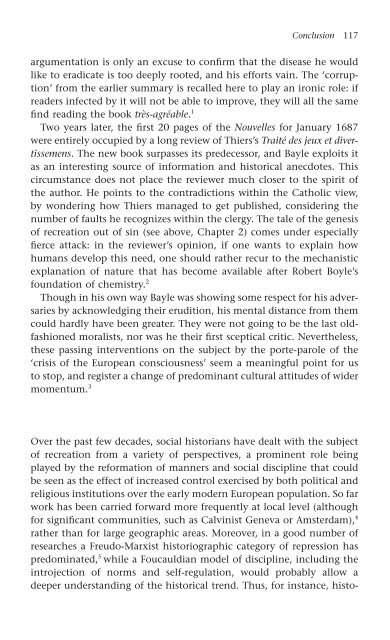Recreation in the Renaissance
Recreation in the Renaissance
Recreation in the Renaissance
- No tags were found...
Create successful ePaper yourself
Turn your PDF publications into a flip-book with our unique Google optimized e-Paper software.
Conclusion 117<br />
argumentation is only an excuse to confirm that <strong>the</strong> disease he would<br />
like to eradicate is too deeply rooted, and his efforts va<strong>in</strong>. The ‘corruption’<br />
from <strong>the</strong> earlier summary is recalled here to play an ironic role: if<br />
readers <strong>in</strong>fected by it will not be able to improve, <strong>the</strong>y will all <strong>the</strong> same<br />
f<strong>in</strong>d read<strong>in</strong>g <strong>the</strong> book très-agréable. 1<br />
Two years later, <strong>the</strong> first 20 pages of <strong>the</strong> Nouvelles for January 1687<br />
were entirely occupied by a long review of Thiers’s Traité des jeux et divertissemens.<br />
The new book surpasses its predecessor, and Bayle exploits it<br />
as an <strong>in</strong>terest<strong>in</strong>g source of <strong>in</strong>formation and historical anecdotes. This<br />
circumstance does not place <strong>the</strong> reviewer much closer to <strong>the</strong> spirit of<br />
<strong>the</strong> author. He po<strong>in</strong>ts to <strong>the</strong> contradictions with<strong>in</strong> <strong>the</strong> Catholic view,<br />
by wonder<strong>in</strong>g how Thiers managed to get published, consider<strong>in</strong>g <strong>the</strong><br />
number of faults he recognizes with<strong>in</strong> <strong>the</strong> clergy. The tale of <strong>the</strong> genesis<br />
of recreation out of s<strong>in</strong> (see above, Chapter 2) comes under especially<br />
fierce attack: <strong>in</strong> <strong>the</strong> reviewer’s op<strong>in</strong>ion, if one wants to expla<strong>in</strong> how<br />
humans develop this need, one should ra<strong>the</strong>r recur to <strong>the</strong> mechanistic<br />
explanation of nature that has become available after Robert Boyle’s<br />
foundation of chemistry. 2<br />
Though <strong>in</strong> his own way Bayle was show<strong>in</strong>g some respect for his adversaries<br />
by acknowledg<strong>in</strong>g <strong>the</strong>ir erudition, his mental distance from <strong>the</strong>m<br />
could hardly have been greater. They were not go<strong>in</strong>g to be <strong>the</strong> last oldfashioned<br />
moralists, nor was he <strong>the</strong>ir first sceptical critic. Never<strong>the</strong>less,<br />
<strong>the</strong>se pass<strong>in</strong>g <strong>in</strong>terventions on <strong>the</strong> subject by <strong>the</strong> porte-parole of <strong>the</strong><br />
‘crisis of <strong>the</strong> European consciousness’ seem a mean<strong>in</strong>gful po<strong>in</strong>t for us<br />
to stop, and register a change of predom<strong>in</strong>ant cultural attitudes of wider<br />
momentum. 3<br />
Over <strong>the</strong> past few decades, social historians have dealt with <strong>the</strong> subject<br />
of recreation from a variety of perspectives, a prom<strong>in</strong>ent role be<strong>in</strong>g<br />
played by <strong>the</strong> reformation of manners and social discipl<strong>in</strong>e that could<br />
be seen as <strong>the</strong> effect of <strong>in</strong>creased control exercised by both political and<br />
religious <strong>in</strong>stitutions over <strong>the</strong> early modern European population. So far<br />
work has been carried forward more frequently at local level (although<br />
for significant communities, such as Calv<strong>in</strong>ist Geneva or Amsterdam), 4<br />
ra<strong>the</strong>r than for large geographic areas. Moreover, <strong>in</strong> a good number of<br />
researches a Freudo-Marxist historiographic category of repression has<br />
predom<strong>in</strong>ated, 5 while a Foucauldian model of discipl<strong>in</strong>e, <strong>in</strong>clud<strong>in</strong>g <strong>the</strong><br />
<strong>in</strong>trojection of norms and self-regulation, would probably allow a<br />
deeper understand<strong>in</strong>g of <strong>the</strong> historical trend. Thus, for <strong>in</strong>stance, histo-










